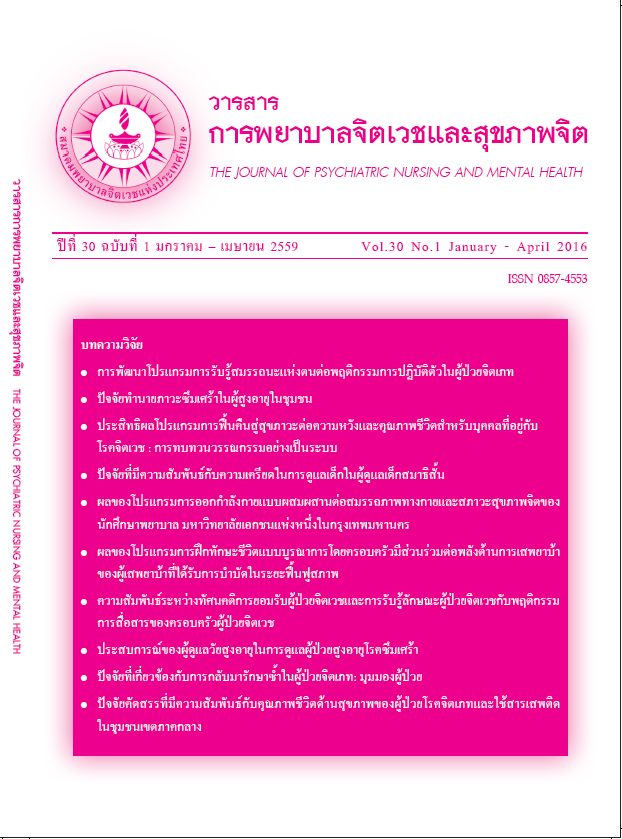ปัจจัยที่มีความสัมพันธ์กับความเครียดในการดูแลเด็กในผู้ดูแลเด็กสมาธิสั้น FACTORS RELATED TO PARENTING STRESS IN CAREGIVERS OF CHILDREN WITH ATTENTION-DEFICIT/HYPERACTIVITY DISORDER
Main Article Content
บทคัดย่อ
Objective: This study aimed at investigating the relationship between behavioral problems of children with attention-deficit/hyperactivity disorder (ADHD), knowledge of ADHD, resilience, family communication, and social support and parenting stress in caregivers of children with ADHD.
Methods: This study was a descriptive correlational research. The sample consisted of 138 caregivers of children with ADHD who sought services at the child and adolescent psychiatric clinic of a hospital under the Department of Mental Health in the north -eastern region of Thailand between June 2015 and July 2015. The subjects were recruited by means of purposive sampling. The instruments used to collect data included a demographic characteristics questionnaire, Parental Stress Scale, Home Situations Questionnaire, ADHD Knowledge Questionnaire, Resilience Inventory, Assessment Form on Communication Behavior in Family, and revised Thai version of the Multi-dimensional Scale of Perceived Social Support. Data were analyzed using frequency, percentage, mean, Pearson’s product moment correlation coefficient, and Spearman’s rank-order correlation.
Results: The findings revealed that behavioral problems of children with ADHD were positively related to parenting stress in caregivers with statistical significance, while family communication, social support and resilience were negatively associated with parenting stress in caregivers with statistical significance. On the other hand, there was no relationship between knowledge of ADHD and parenting stress in the caregivers. The findings could be utilized as a baseline data to subsequently develop a guideline to prevent or reduce parenting stress in the caregivers of children with ADHD.
วัตถุประสงค์: เพื่อศึกษาความสัมพันธ์ระหว่างปัญหาพฤติกรรมของเด็กสมาธิสั้น ความรู้เกี่ยวกับโรคสมาธิสั้น ความแข็งแกร่งในชีวิต การสื่อสารในครอบครัว และแรงสนับสนุนทางสังคมกับความเครียดในการดูแลเด็กในผู้ดูแลเด็กสมาธิสั้น
วิธีการศึกษา: การวิจัยครั้งนี้เป็นการวิจัยเชิงบรรยายความสัมพันธ์ กลุ่มตัวอย่างเป็นผู้ดูแลเด็กสมาธิสั้นซึ่งเข้ารับบริการที่คลินิกจิตเวชเด็กและวัยรุ่น โรงพยาบาลสังกัดกรมสุขภาพจิตแห่งหนึ่งในภาคตะวันออกเฉียงเหนือระหว่างเดือนมิถุนายน พ.ศ. 2558 ถึง เดือนกรกฎาคม พ.ศ. 2558 จำนวน 138 คน เลือกกลุ่มตัวอย่างแบบเฉพาะเจาะจงตามเกณฑ์การคัดเลือกกลุ่มตัวอย่าง เครื่องมือที่ใช้ประกอบด้วย แบบสอบถามข้อมูลทั่วไป แบบวัดความเครียดของผู้ดูแล แบบประเมินปัญหาพฤติกรรมของเด็กที่แสดงออกเวลาอยู่ที่บ้าน แบบประเมินความรู้เรื่องโรคสมาธิสั้น แบบประเมินความแข็งแกร่งในชีวิต แบบประเมินพฤติกรรมการสื่อสารในครอบครัว และแบบสอบถามแรงสนับสนุนทางสังคม วิเคราะห์ข้อมูลโดยใช้สถิติความถี่ ร้อยละ ค่าเฉลี่ยสหสัมพันธ์แบบเพียร์สัน และสหสัมพันธ์แบบสเปียร์แมน
ผลการศึกษา: ปัญหาพฤติกรรมของเด็กสมาธิสั้น มีความสัมพันธ์ทางบวกกับความเครียดในการดูแลเด็กในผู้ดูแลเด็กสมาธิสั้น อย่างมีนัยสำคัญทางสถิติ การสื่อสารในครอบครัว แรงสนับสนุนทางสังคม และความแข็งแกร่งในชีวิต มีความสัมพันธ์ทางลบกับความเครียดในการดูแลเด็กในผู้ดูแลเด็กสมาธิสั้น อย่างมีนัยสำคัญทางสถิติ และพบว่าความรู้เกี่ยวกับโรคสมาธิสั้น ไม่มีความสัมพันธ์กับความเครียดในการดูแลเด็กในผู้ดูแลเด็กสมาธิสั้น ผลการวิจัยครั้งนี้สามารถนำไปเป็นข้อมูลพื้นฐานสำหรับพัฒนาแนวทางการป้องกันหรือลดความเครียดในการดูแลเด็กในผู้ดูแลเด็กสมาธิสั้นต่อไป
Article Details
บทความที่ได้รับการตีพิมพ์แล้ว เป็นลิขสิทธิ์ของสมาคมพยาบาลจิตเวชแห่งประเทศไทย


